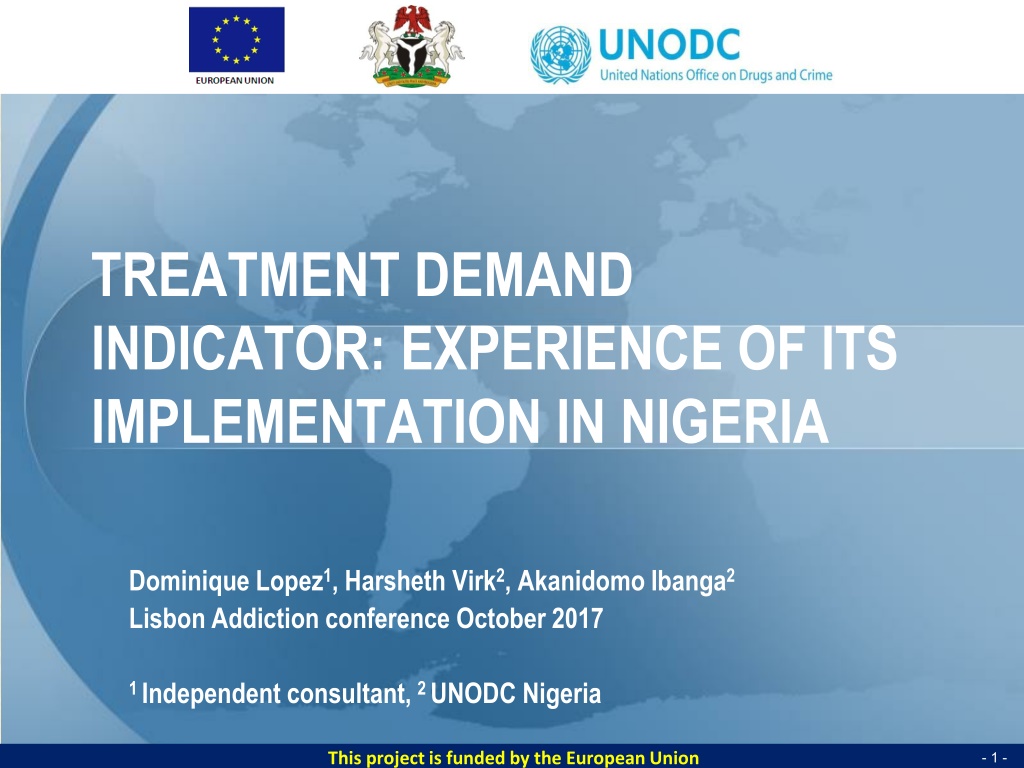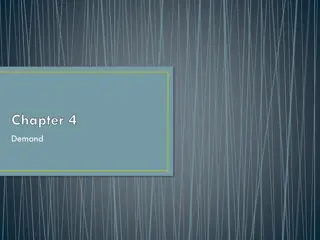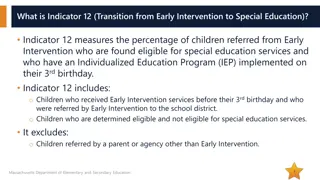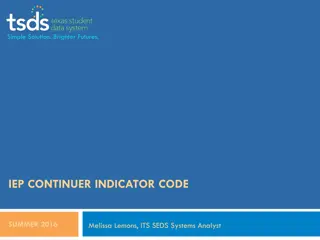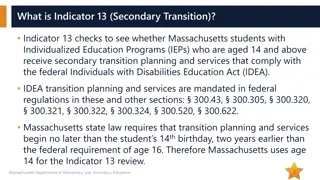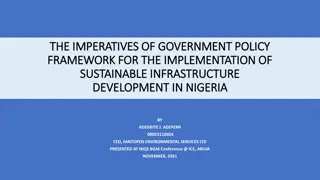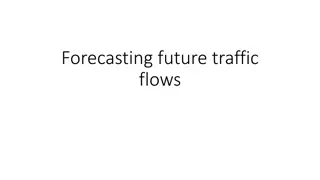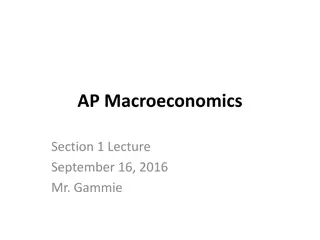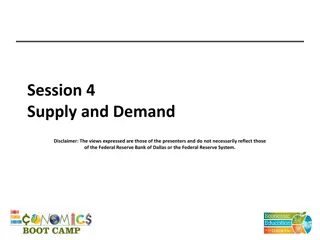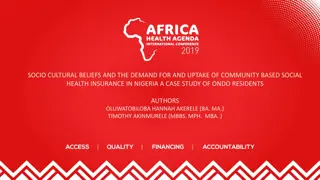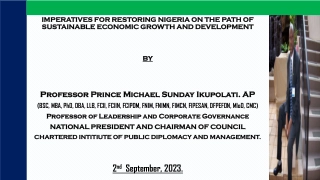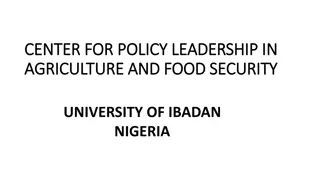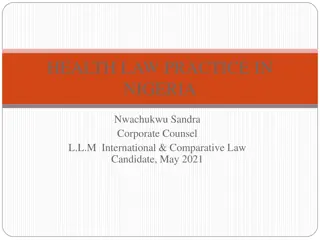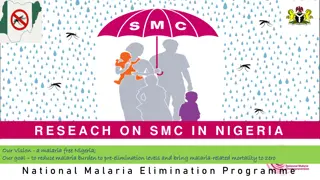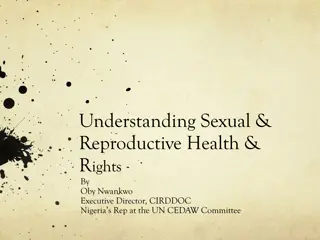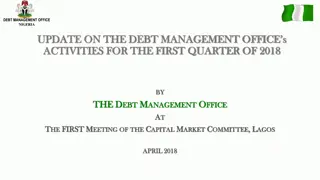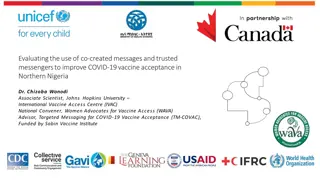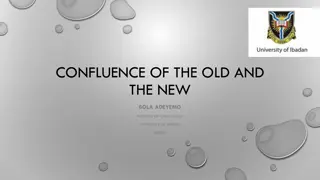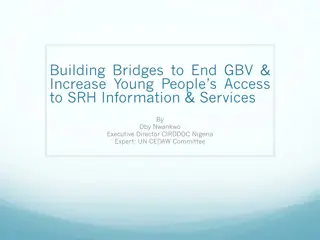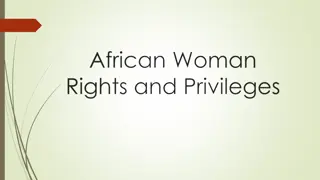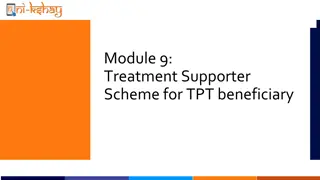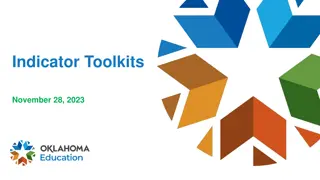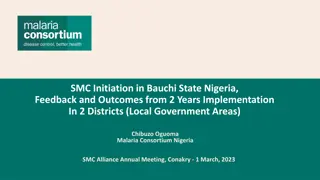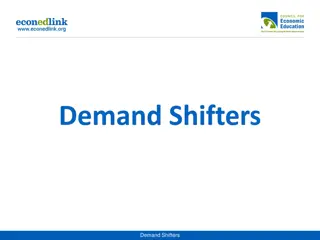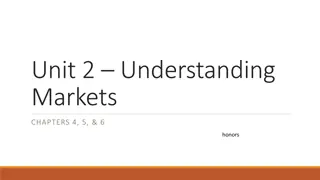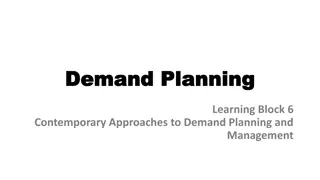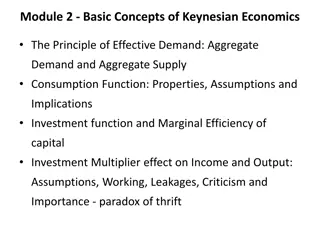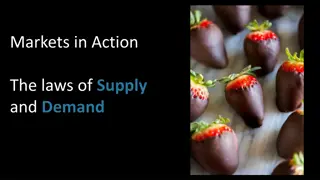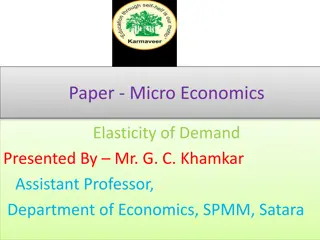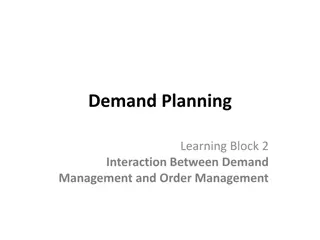Implementation of Treatment Demand Indicator in Nigeria
Experience of implementing the Treatment Demand Indicator (TDI) in Nigeria was discussed at the Lisbon Addiction Conference in October 2017. The Nigerian Epidemiological Network on Drug Use (NENDU) reported on patients entering treatment facilities, with cannabis being the main substance driving treatment demand followed by opioids and alcohol. In 2016, 990 treatment episodes were provided to 989 patients, highlighting key demographic characteristics and patterns of substance use in Nigeria.
Download Presentation

Please find below an Image/Link to download the presentation.
The content on the website is provided AS IS for your information and personal use only. It may not be sold, licensed, or shared on other websites without obtaining consent from the author. Download presentation by click this link. If you encounter any issues during the download, it is possible that the publisher has removed the file from their server.
E N D
Presentation Transcript
TREATMENT DEMAND INDICATOR: EXPERIENCE OF ITS IMPLEMENTATION IN NIGERIA Dominique Lopez1, Harsheth Virk2, Akanidomo Ibanga2 Lisbon Addiction conference October 2017 1 Independent consultant, 2 UNODC Nigeria - 1 - This project is funded by the European Union
West Africa Nigeria Capital: Abuja Pop: 174 million (1stlargest population in Africa, 7thlargest in the world) HDI: 152 out of 187 Nigeria Production of herbal cannabis, methamphetamines Platform for trafficking: amphetamines and its precursors, cocaine, heroin LYP of heroin = 2.2% (2009) and LYP of injection = 1.9% (2009) HDI: Human development Index (UNDP) - 2 - This project is funded by the European Union
TDI in Nigeria Nigerian Epidemiological Network on Drug Use (NENDU) February 2015: 11 treatment facilities reporting on patients entering treatment May 2016: major revision reporting fully in line with EMCDDA Treatment demand indicator (TDI) With some necessary national adjustments Alcohol can be declared as primary drug Tobacco can be declared as secondary drug Unique ID allowing for counting number of treatment episodes and clients Additional questions requested for regional reporting (ECOWAS) - 3 - - 3 - This project is funded by the European Union This project is funded by the European Union
NENDU Treatment facilities reporting 10 hospitals (1 national, 6 neuropsychiatric, 3 teaching) 1 private center 7 commands of law enforcement agency (NDLEA) - 4 - This project is funded by the European Union
NENDU Results In 2015: 1044 treatment episodes were provided In 2016: 990 treatment episodes were provided to 989 patients 2016 95% of patients are male 60% admitted as inpatient Median age = 28 years old 79% are single 97% living in stable accommodation 59% live in urban area 40% admitted on involuntary basis - 5 - - 5 - This project is funded by the European Union This project is funded by the European Union
Substance(s) at the origin of the treatment demand (primary drug), Nigeria, NENDU 2016 Main substance at origin of treatment is cannabis Followed by opioids (36%) Alcohol is third most important (11%) Crack and crack cocaine only 5% (very pricy) Sedative = BZDs (3%) - 6 - This project is funded by the European Union
Cannabis users entering treatment Nigeria (NENDU, 2016) Europe (EMCDDA, 2015) 29 29 20 3% 97% 62% 38% - 7 - This project is funded by the European Union
Opioids at the origin of the treatment demand (primary drug) Nigeria (NENDU, 2016) Europe (EMCDDA, 2015) Opioids limited to prescription drugs - 8 - This project is funded by the European Union
Substance(s) at the origin of the treatment demand (primary drug) by gender, in Nigeria, NENDU 2016 5% of entrants are female - 10 - - 10 - This project is funded by the European Union This project is funded by the European Union
NENDU 2016 Results Patients who declared having injected in their lifetime is 6,0% Among the current injectors (5%), a large majority are primary users of pentazocine Among the injectors 79% declared having never shared their equipment 51% of patients have been screened for HIV during their lifetime The level of screening of HCV is far lower, 17% of the patients have been screen for HCV in their lifetime - 11 - - 11 - This project is funded by the European Union This project is funded by the European Union
TDI in Nigeria - Conclusions (1) NENDU fully in line with international standards 2017 is the 3rdconsecutive year of data collection Continuity of the treatment information system is at stake and efforts should be maintained to ensure the sustainability of the network Handover to local authorities already started aiming at building confidence and embedding processes into daily routine Inclusion of more facilities in the network has been delayed Still battling with High level political endorsement and policy leadership Capacity building Local funding - 12 - - 12 - This project is funded by the European Union This project is funded by the European Union
TDI in Nigeria - Conclusions (2) NENDU allows to better understand treatment access and points to treatment gaps in the country expand community based treatment to increase treatment access to indigent drug users as drug treatment in Nigeria is currently limited to people who can afford it expand number of beds per facility for drug users diversify the drug treatment offer based on the needs of clients, especially opiates users Consider strategies to reach female drug users Ensure that HIV, HCV and HBC testing are available to drug users Ensure appropriate care of drug users with co-morbidities - 13 - - 13 - This project is funded by the European Union This project is funded by the European Union
Acknowledgment The NENDU has been created and developed in the framework of the programme financed by the EU and implemented by UNODC: Response to drugs and related organized crime in Nigeria Participating and dedicated Nigerian organisations working everyday towards the smooth and continuous implementation of NENDU Federal Neuro-Psychiactric Hospital, Maiduguri; Federal Neuro-Psychiactric Hospital; Federal Neuro-Psychiactric Hospital, Benin; Federal Neuro- Psychiactric Hospital, Enugu; Federal Neuro-Psychiactric Hospital, Aro; Federal Neuro-Psychiactric Hospital, Yaba; Aminu Kano Teaching Hospital (AKTH); University Teaching Hospital, Port Harcourt; Jos University Teaching Hospital; National Hospital Abuja; Quintessential Health Care Center (QHC) Federal Ministry of Health (FMOH) and National Drug Law Enforcement Agency (NDLEA) - 14 - - 14 - This project is funded by the European Union This project is funded by the European Union
